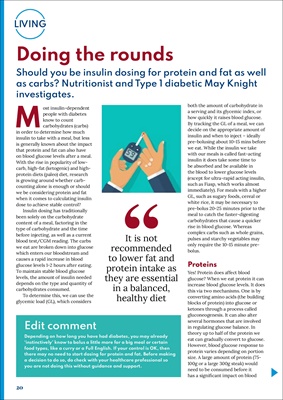
20
LIVING
Doing the rounds
Should you be insulin dosing for protein and fat as well
as carbs? Nutritionist and Type 1 diabetic May Knight
investigates.
Most insulin-dependent
people with diabetes
know to count
carbohydrates (carbs)
in order to determine how much
insulin to take with a meal, but less
is generally known about the impact
that protein and fat can also have
on blood glucose levels after a meal.
With the rise in popularity of lowcarb,
high-fat (ketogenic) and highprotein
diets (paleo) diet, research
is growing around whether carbcounting
alone is enough or should
we be considering protein and fat
when it comes to calculating insulin
dose to achieve stable control?
Insulin dosing has traditionally
been solely on the carbohydrate
content of a meal, factoring in the
type of carbohydrate and the time
before injecting, as well as a current
blood test/CGM reading. The carbs
we eat are broken down into glucose
which enters our bloodstream and
causes a rapid increase in blood
glucose levels 1-2 hours after eating.
To maintain stable blood glucose
levels, the amount of insulin needed
depends on the type and quantity of
carbohydrates consumed.
To determine this, we can use the
glycemic load (GL), which considers
both the amount of carbohydrate in
a serving and its glycemic index, or
how quickly it raises blood glucose.
By tracking the GL of a meal, we can
decide on the appropriate amount of
insulin and when to inject - ideally
pre-bolusing about 10-15 mins before
we eat. While the insulin we take
with our meals is called fast-acting
insulin it does take some time to
be absorbed and be available in
the blood to lower glucose levels
(except for ultra-rapid acting insulin,
such as Fiasp, which works almost
immediately). For meals with a higher
GL, such as sugary foods, cereal or
white rice, it may be necessary to
pre-bolus 20-25 minutes prior to the
meal to catch the faster-digesting
carbohydrates that cause a quicker
rise in blood glucose. Whereas
complex carbs such as whole grains,
pulses and starchy vegetables may
only require the 10-15 minute prebolus.
Proteins
Yes! Protein does affect blood
glucose? When we eat protein it can
increase blood glucose levels. It does
this via two mechanisms. One is by
converting amino acids (the building
blocks of protein) into glucose or
ketones through a process called
gluconeogenesis. It can also alter
several hormones that are involved
in regulating glucose balance. In
theory up to half of the protein we
eat can gradually convert to glucose.
However, blood glucose response to
protein varies depending on portion
size. A large amount of protein (75-
100g or a large 300g steak) would
need to be consumed before it
has a significant impact on blood
It is not
recommended
to lower fat and
protein intake as
they are essential
in a balanced,
healthy diet
Edit comment
Depending on how long you have had diabetes, you may already
'instinctively' know to bolus a little more for a big meal or certain
food types, like a curry or a Full English. If your control is OK, then
there may no need to start dosing for protein and fat. Before making
a decision to do so, do check with your healthcare professional so
you are not doing this without guidance and support.